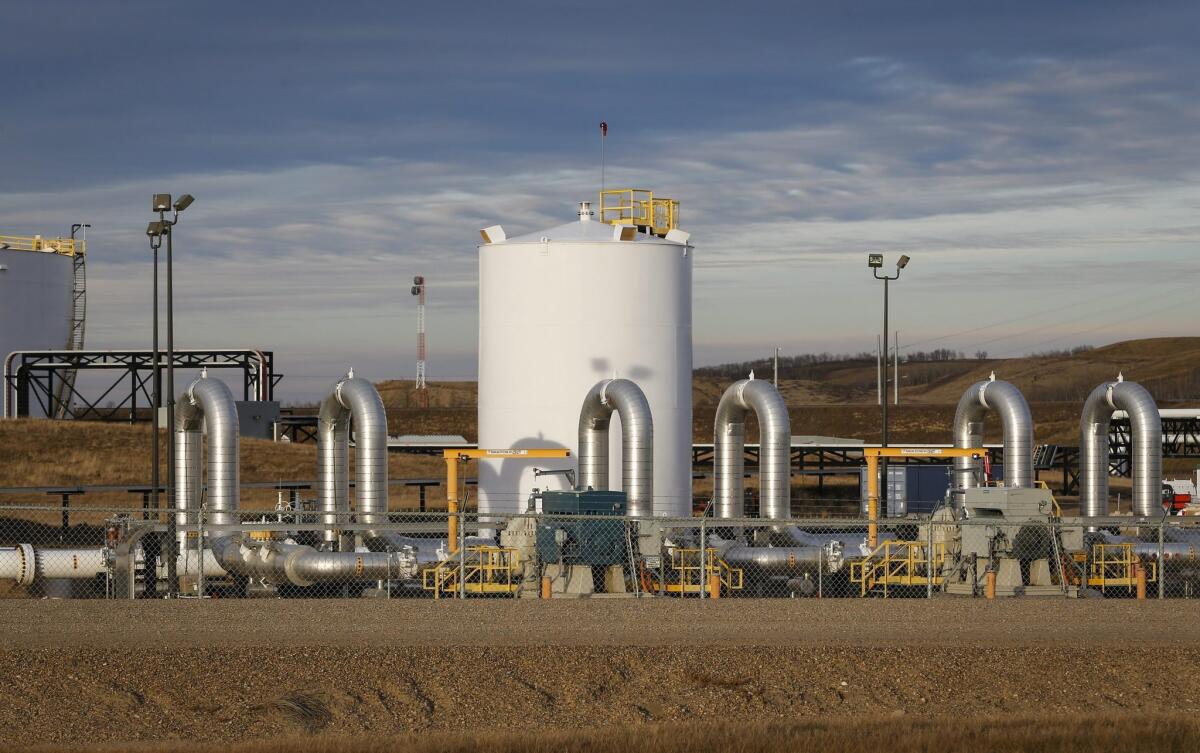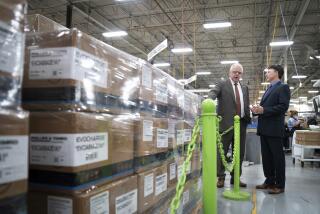Stung by Keystone reversal, Canadian province doubles down on renewable energy

After the White House rejected an agreement on TransCanada’s Keystone XL pipeline, the Canadian province of Alberta announces a new push toward renewable energy.
Reporting from Ottawa — After getting a “major wake-up call” from the U.S. government in its rejection of the Keystone XL pipeline project, the leader of the Canadian province of Alberta announced an aggressive climate-change plan Sunday that sets emission limits for the oil sands and begins the transition from coal to renewable electricity sources.
“This is the day we step up, at long last, to one of the world’s biggest problems — the pollution that is causing climate change,” Rachel Notley, the premier of the western Canadian province, said at the announcement in Alberta’s capital, Edmonton. “This is the day we stop denying there is an issue.”
Under the plan, as recommended by a Climate Change Advisory Panel appointed by Notley’s left-of-center New Democrat government after its election six months ago, Alberta plans to phase out all coal emissions by 2030 and replace two-thirds of coal-generated electricity with renewable energy sources, primarily wind power.
Alberta will also introduce an economy-wide carbon tax of 20 Canadian dollars per ton on carbon-dioxide emissions starting in 2017, increasing to 30 Canadian dollars per ton the year after — a price hike estimated to be slightly less than 2 cents per gallon of gasoline. The tax will apply to a wide range of carbon sources, including vehicles and home furnaces.
Currently, only companies producing more than 100,000 tons of carbon annually have to pay a levy.
Notley said the carbon-pricing strategy is similar to plans being implemented in California and Canada’s French-speaking province of Quebec.
Alberta’s government also plans to legislate an overall emission limit of 100 megatons for the oil sands, which currently generate 70 megatons of carbon a year.
President Obama and environmental groups have characterized Alberta crude oil as dirty, a point Notley addressed in her speech.
“That is the reputation that mistaken government policies have earned for us,” she said. “We are a landlocked energy producer with a single market, [which] just took a very hard run at us.”
“We need to do better, and we are going to do better.”
Environmental groups in both the U.S. and Canada praised Alberta’s landmark announcement.
“The sun is setting on the tar sands industry,” Stephen Kretzmann, executive director of a Washington-based clean-energy advocacy group, Oil Change International, said in a statement. “It is now possible to see a new day for Alberta where high-cost, high-carbon, high-risk tar sands are phased out in favor of clean, safe and renewable energy.”
He noted that Keystone XL, which would have helped deliver 800,000 barrels of crude oil a day from Alberta to the U.S. Gulf Coast, “was the first oil project ever stopped because of its climate impacts — and this is just the beginning.”
Karen Mahon, director of ForestEthics Canada, said in a statement that by establishing a price and a regulatory limit on carbon pollution, along with transitioning from coal to renewable electricity, Alberta’s plan moves the province “from climate laggard to climate leader.”
She said 3 million barrels of crude oil per day, or half the amount that is currently extracted in Alberta, will stay in the ground as a result of the plan.
“This is a game changer for Alberta and Canada,” she said.
Notley will join her fellow premiers from the nine other Canadian provinces and three territories in Ottawa on Monday in their first meeting with newly elected Liberal Prime Minister Justin Trudeau. The issue of climate change is expected to top the agenda as Trudeau and the premiers prepare to travel to the 21st session of the U.N. Conference of Parties (COP21) climate summit that begins Nov. 30 in Paris.
On Sunday, Canadian Environment and Climate Change Minister Catherine McKenna called Alberta’s climate-change plan a “strong, positive step in the right direction” that helps send a “clear signal” that Canada is “back and ready” to play its part in addressing climate change.
In a prepared statement, she said that Canada would build on Alberta’s initiative to phase out coal and explore ways to help accelerate the reduction of coal power across the country.
Trudeau has committed to unveiling a pan-Canadian climate-change strategy within 90 days of the Paris climate conference, and McKenna said the Canadian government would work with its provincial and territorial counterparts to “put a price on carbon, reduce emissions and invest in clean technologies.”
Canadian Green Party Leader Elizabeth May, the only member of her party to hold a seat in the House of Commons, said in an interview that Alberta joins Canada’s three other large provinces, Ontario, Quebec and British Columbia, which are “generally on the right side of the page” in pushing Canada to embrace better national carbon-emission reduction targets on the eve of COP21.
But she also hoped that Alberta would phase out coal sooner than within 15 years and set a lower cap on greenhouse-gas emissions from the oil sands than the 100-megaton-target announced Sunday.
By comparison, Ontario, Canada’s most populous province, became the first North American jurisdiction to eliminate coal-fired electricity last year when it closed its last generating station.
Still, May believes that Alberta’s “progressive” climate-change strategy could help Trudeau take a leadership role at COP21 and demonstrate that Canada, which under Stephen Harper’s Conservative government withdrew from the Kyoto Accord in 2011 and set “the G7’s weakest and least ambitious” greenhouse gas emission reduction target of 30% below 2005 levels by 2030, can “inject new energy” into the negotiations and push other countries that have been deadlocked over their own targets.
During a joint news conference with U.S. President Obama last week at the Asia-Pacific Economic Cooperation (APEC) summit in Manila, Trudeau said that one of his priorities is to “reassure Canadians and others that we are serious about meeting reduction targets, about being positive actors on the world stage in the fight against climate change, and demonstrating a future in renewables and smart investments around energy.”
At the same news conference, Obama told reporters that both the U.S. and Canada “have to shift increasingly away from carbon-emitting energy sources.”
Guly is a special correspondent
ALSO
Asia as important to U.S. security as the Middle East is, Obama says
Donald Trump calls for waterboarding to combat Islamic State
‘Suspicious behavior’ causes LAX-bound flight to be diverted
More to Read
Sign up for Essential California
The most important California stories and recommendations in your inbox every morning.
You may occasionally receive promotional content from the Los Angeles Times.









